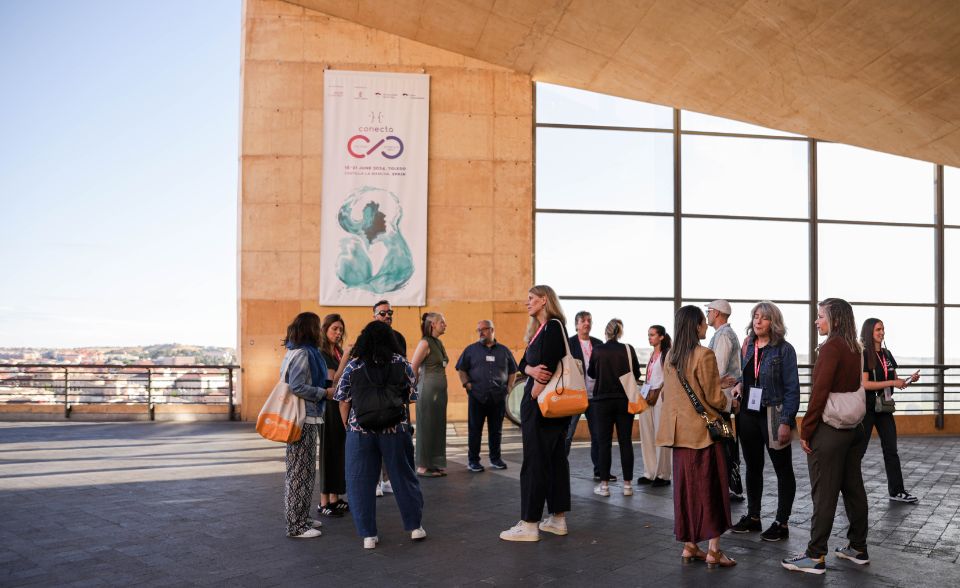Brazil and Portugal, the two focus countries of the eighth edition, had the largest presence of producers, followed by France, the United States, the United Kingdom, Germany, Chile, Argentina, and Mexico.
The eighth edition of Conecta Fiction & Entertainment concludes today in Toledo. This is the meeting point for a large group of professionals from the global fiction and entertainment industry, who gathered for four days to promote co-production between the Americas and Europe.
The press conference at which the summary of this international event was presented this morning has been attended by Ana Isabel Fernández, Director General of Tourism, Trade and Crafts of Castilla-La Mancha, and the Director of Conecta Fiction & Entertainment, Géraldine Gonard.
Fernández highlighted the magnificent opportunity that the Castilla-La Mancha Film Commission’s participation in Conecta 2024 has given the regional government: ” In these three days, we have held 48 meetings, from which six projects have materialized that will be filmed next year in Castilla-La Mancha.”
Gonard provided the main figures for this third edition held in Toledo. It brought together around a thousand professionals (almost the same number as last year) from 33 countries on both continents, with 70% from Europe and 30% from Latin America.
In terms of participation by country, she mentioned that, as usual in international meetings, the weight of national representation has been very important, reaching 65%. The presence of European and American executives was very balanced, with Brazil and Portugal, the two Focus Countries of this year’s edition, being the most represented nationalities, followed by France, the United States, the United Kingdom, Germany, Chile, Argentina, and Mexico.
As for the profile of the participants, Gonard pointed out that it was mainly made up of commissioners, platforms, TV broadcasters, buyers, producers, talent, institutional representatives and delegations from other countries.
More than 3,500 face-to-face meetings were held at the Palacio de Congresos El Greco, and participants were offered 24 panels, 11 keynotes, 6 pitching sessions open to the public, 4 private pitching sessions, 4 Commissioners Pitching sessions, 8 workshops, and 3 after-work meetings. Six created a special program dedicated to Brazil and Portugal as focus countries.
The performance of the premium activities has been unbeatable: 55 top-level delegates debated on Tuesday on the present and future challenges of the audiovisual industry at the fifth edition of Conecta Think Tank (the conclusions of which are set out below).
27 participants took part in the bilateral meeting between institutions and production companies from France and Spain; and 4 networking breakfasts were organized by various partners with 141 participants.

Conecta Think Tank 2024’s Conclusions
A new phase of corporate mergers & acquisitions is predicted by 2025, which could result in an audiovisual landscape with many smaller projects.
Budgets have not been reduced internationally in all regions, but inflation has affected the industry globally.
FAST channels are not fully understood by creatives, and it is crucial to address this lack of awareness soon.
Preserving intellectual property rights and ensuring fair compensation for audiovisual creatives is complex, with practices varying by country and content type.
Transparent measures of success, fair negotiation practices, and co-production support agreements are essential to balancing the interests of creators, producers, and media services.
Funding beyond Europe, North America, and the English-speaking axis requires government policies that promote the audiovisual industry as a tool for job creation, economic growth, and national branding.
Stronger measures and many small actions are needed to boost the audiovisual industry as a leader in sustainability.
Artificial intelligence in the entertainment industry goes beyond generative AI, and legislation that does not hinder progress is needed.
AI should pay a fee to anyone using content to create new content to provide transparency in this business. Governments should prepare a plan for people to learn and adapt to the changes that AI brings rather than taking AI companies to court, using fees collected from AI actors. Prevention and protection rather than reaction.
And a very interesting conclusion on the presentation of the Spain Audiovisual Bureau, which also took place during this day: Spain is at the forefront of promoting its audiovisual sector, and as a country brand, there is nothing similar in Europe and America.











